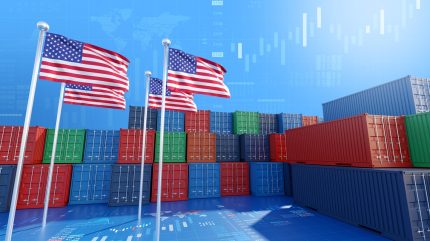
Section 301 of the Trade Act empowers USTR to respond to foreign practices that unfairly burden or discriminate against US commerce.
The suggested countermeasures by USTR involve charges on imported goods entering US ports and stipulations regarding the origin of vessels for exported goods – impacting imports as well. USTR has proposed a “fee remission” scheme offering up to $1m per entry for maritime operators that use ships made in the USA. Additionally, there’s a call for restrictions on using China’s National Transportation and Logistics Public Information Platform (LOGINK).
In his written testimony, AAFA policy senior vice president Nate Herman said that the implementation of these fees could lead to job losses for American workers, increased costs for both exports and imports, and a scarcity of goods that may drive up prices for families in the US.
He cited a recent AAFA-funded study that indicates these measures could cause a significant 11.56% drop in US exports and a 0.23% contraction in the nation’s GDP.
Nate Herman said: “The proposed actions in this Section 301 investigation could have serious and far-reaching consequences for American businesses, for American famers, for American workers, for American consumers, and for the US economy…while doing nothing to build a resilient US maritime industry.
“We strongly urge the administration to reconsider these proposals and adopt a more balanced approach that fosters the growth of a competitive American shipbuilding industry while mitigating harm to the broader US economy.”
The US boasts over 300 ports, but only ten are considered major. Herman explained that should the new fees be applied to every port visit, it is likely that shipping companies will consolidate their stops to a single US port to cut down on expenses. This strategy would drastically reduce traffic to smaller, secondary ports, potentially leading to their decline or shutdown and resulting in substantial job losses among American dockworkers.
According to the latest data, there are 182 US-flagged ships, which represent a mere 0.4% of the global fleet comprising 43,779 vessels – and not all of these US-flagged ships are built domestically, noted Herman. This stark discrepancy highlights a significant gap in the maritime industry that needs addressing before further regulatory action is taken against shippers, he added.
He also suggested that the government focus on enhancing the competitiveness of the American shipbuilding industry before imposing penalties on shippers who lack economically viable American shipping options.
The proposed USTR actions follow a formal request submitted by a collective of five labour organisations on 12 March 2024.
The labour unions alleged that China’s conduct and regulatory framework are hindering the international competitiveness of the American shipbuilding sector.
The groups called for financial intervention to decrease the production costs of vessels constructed in the US to level the playing field with Chinese counterparts. They recommended imposing a levy on each vessel originating from China that docks at American ports if China’s practices persist, with the proceeds directed towards subsidising domestic shipbuilding.
Following these accusations, USTR commenced an official investigation on 17 April under Section 301, inviting public commentary and conducting a hearing on 29 May through its dedicated committee.
On 16 January 2025, USTR published findings affirming that China’s strategic focus on maritime and shipbuilding sectors is deemed unreasonable and hampers US trade, thus warranting action.
Subsequently, on 27 February, USTR put forth a series of proposed countermeasures exceeding those requested by the unions. These included docking fees for carriers operating Chinese-manufactured vessels and export constraints aimed at bolstering the American shipbuilding industry.
Actions will impact import, export prices
The National Retail Federation (NRF) and Retail Industry Leaders Association (RILA), which has more than 200 members, also submitted joint comments, warning that these proposed actions would negatively affect import and export prices.
The retailers expressed concerns that the proposed port service fees would significantly increase costs for cargo owners. They also highlighted that carriers might alter their routes to bypass these fees by omitting smaller ports, potentially leading to congestion at larger ports and exacerbating existing supply chain challenges.
NRF government relations executive vice president David French said: “We encourage the administration to continue to investigate the barriers and limitations on US shipbuilding and to seek other means to help revitalise the industry, without burdening those who rely upon it.”
RILA public affairs senior executive vice president said Michael Hanson added: “The goal of revitalising the American shipbuilding industry is laudable, however, these new fees will have ripple effects across the US economy. If enacted, these policies will disrupt the flow of commerce, add regulatory burdens and increase costs on American manufacturers and consumers. RILA looks forward to collaborating with the administration on ways to revitalise the US shipping industry while minimising disruptions to competitiveness, businesses and consumers.”
Earlier this month, Jamieson Greer was confirmed as the new USTR to push for fair trade practices and revive the American manufacturing industry.



